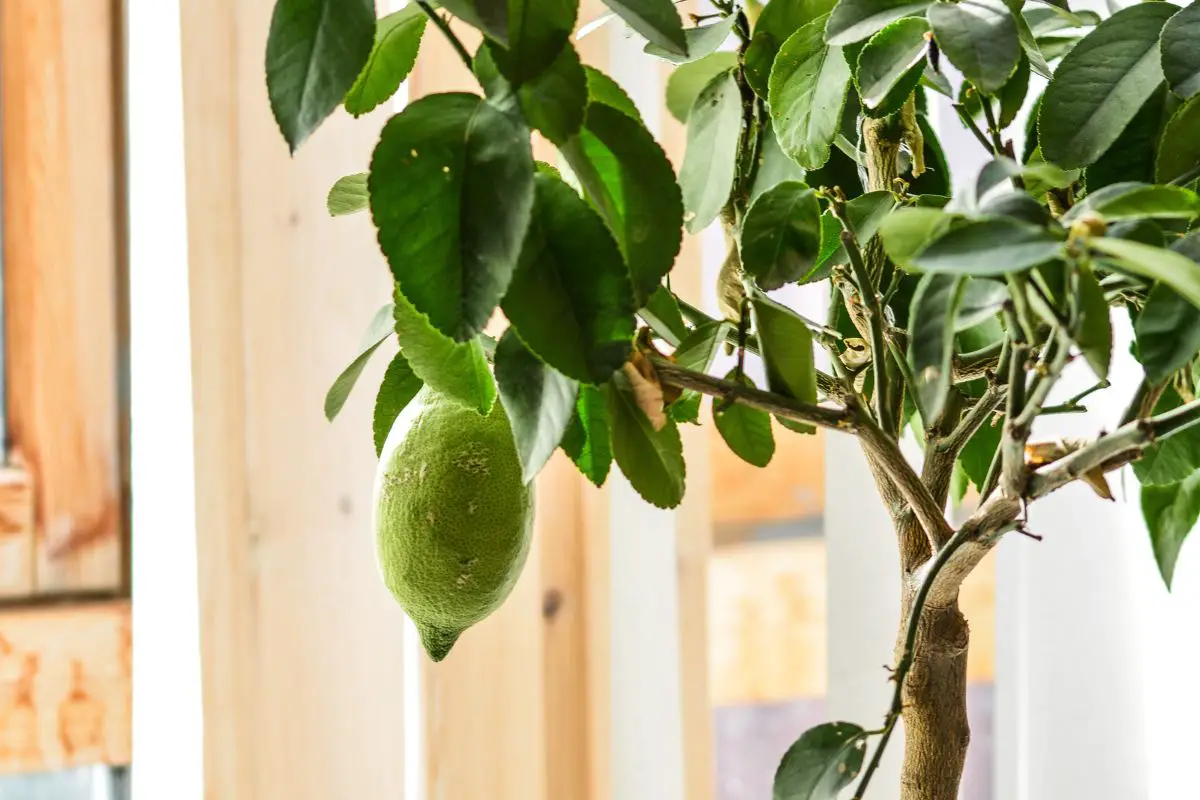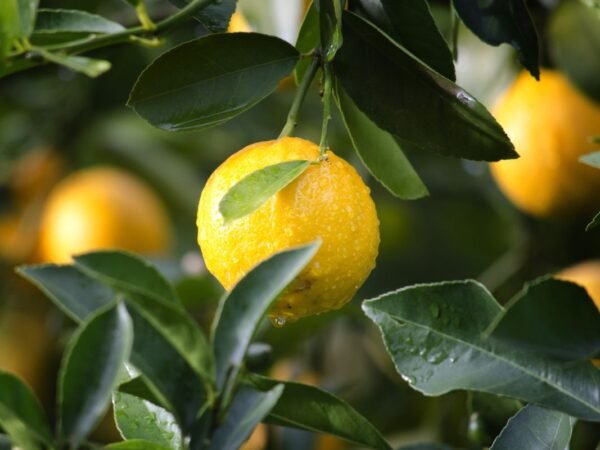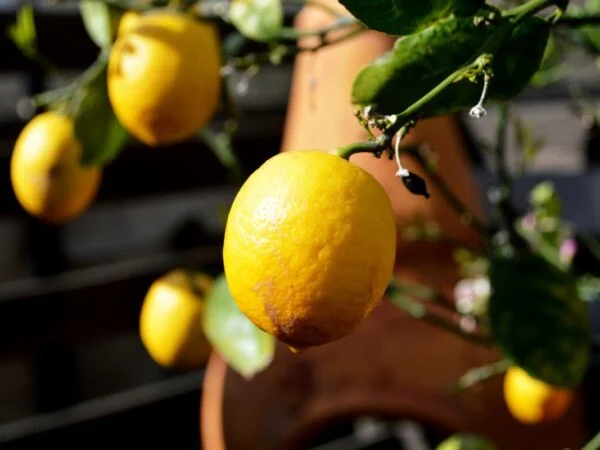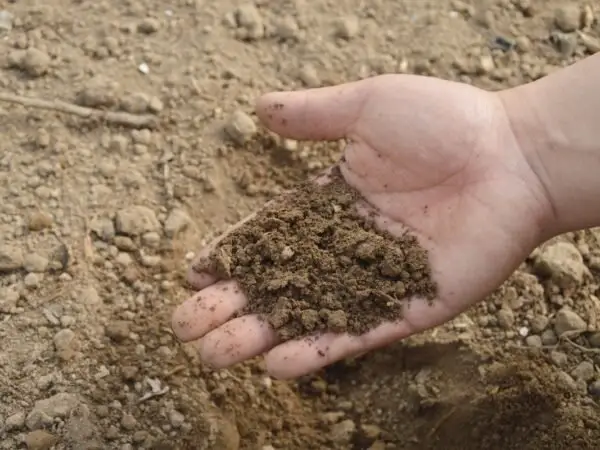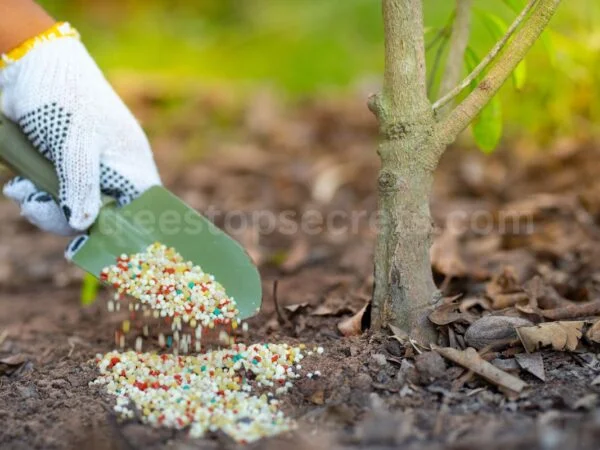Proper irrigation and fertilizing are essential for the health and vitality of lemon trees. Watering is crucial for the growth and development of the fruit, while fertilizing provides the necessary nutrients for optimal lemon tree health. Whether you're a seasoned gardener or just starting out, understanding the best irrigation and fertilizing techniques can make all the difference in the success of your lemon tree. We will provide an overview of upcoming sections that will delve into specific irrigation techniques and schedules for fertilizing plants, taking into consideration the weather. By gaining a deeper understanding of how to effectively water your lemon tree using proper irrigation techniques, you'll be able to promote optimal growth and fruit production, regardless of the weather conditions. This is especially important if you are growing your lemon tree in a container. Additionally, proper watering is crucial for maintaining overall plant health.
Understanding the Water Needs of Lemon Trees
To ensure the optimal growth and health of your lemon tree, it's crucial to understand its water requirements. Proper irrigation is essential for the fruit-bearing plant, especially when it is grown in a container. Several factors, such as soil moisture levels, temperature, and other environmental conditions, influence the irrigation needs of a lemon tree. Proper watering is crucial for the fruit's flavor and growth, especially when grown in containers. By assessing the fruit, container, and signs of thirst of your lemon tree, you can determine when it's time to water your tree each week.
Factors Influencing the Water Requirements of Lemon Trees
The water needs of lemon trees, a type of fruit tree, are influenced by various factors that impact their overall health and growth. One important factor to consider is the container in which the lemon tree is planted. These factors include:
- Size and Age: Younger fruit trees, such as lemon trees, generally have shallower root systems and require more frequent watering compared to mature trees with deeper roots.
- Soil Type: The type of soil in which your fruit tree is planted affects its water retention capabilities. Sandy soils, which are ideal for growing citrus trees, drain quickly and require more frequent watering. On the other hand, clay soils, which are also suitable for indoor lemon trees, retain moisture for longer periods.
- Sunlight Exposure: Lemon trees thrive in full sunlight but may require more water if exposed to intense heat for extended periods.
- Humidity Levels: Higher humidity reduces the rate at which indoor lemon trees and citrus trees lose moisture through transpiration, resulting in lower water requirements.
Significance of Soil Moisture Levels for Optimal Growth
Monitoring soil moisture levels is crucial for maintaining the health of your lemon tree. The ideal soil moisture level for a lemon tree is moist but not saturated or overly dry.
Here are some key indicators to assess soil moisture levels for your indoor lemon trees or any other citrus tree.
- Visual Inspection: Check the color and texture of the soil around your lemon tree. Moist soil, like that of a citrus tree, appears darker and feels slightly damp to the touch.
- Finger Test: Insert your finger into the soil up to about an inch deep near the base of the tree. If the soil around your citrus tree feels dry at this depth, it's time to water.
- Using a Moisture Meter for your citrus tree: A moisture meter provides an accurate reading of the soil moisture levels for your citrus tree and helps determine if watering is necessary.
Relationship Between Temperature and Water Needs in Citrus Trees
Temperature plays a significant role in the water requirements of lemon trees. Higher temperatures increase the rate of evaporation, leading to increased water loss through transpiration. As a result, lemon trees may require more frequent watering during hot summer months or in regions with high temperatures.
On the other hand, cooler temperatures reduce the rate of evaporation and transpiration, resulting in lower water requirements. During colder months or in regions with milder climates, you may need to adjust your watering schedule accordingly.
How to Assess When a Lemon Tree Requires Watering
While understanding the factors influencing water needs is essential, it's equally important to monitor your lemon tree for signs that it requires watering. Here are some indicators that your lemon tree may be thirsty:
- Wilting Leaves: Drooping or wilting leaves can indicate insufficient water supply.
- Dry Soil: If the soil around your lemon tree feels dry to touch at about an inch deep, it's time for watering.
- Yellowing Leaves: Yellowing foliage can be a sign of both overwatering and underwatering. However, if combined with dry soil and wilting leaves, it likely indicates a lack of sufficient water.
- Slow Growth: If your lemon tree's growth seems stunted or slower than usual, inadequate hydration could be a contributing factor.
By paying attention to these signs and adjusting your watering routine accordingly, you can ensure that your lemon tree receives adequate hydration for healthy growth.
Determining the Water Requirements for Citrus Trees
To ensure the health and productivity of your lemon tree, it's crucial to understand its water requirements. Differentiating between mature and young lemon trees is essential in determining their specific needs. Considering root depth and understanding evapotranspiration rates will help you provide adequate moisture for your citrus tree.
Mature vs. Young Lemon Tree Water Needs
Mature lemon trees have different water requirements compared to young ones. Mature trees have a well-established root system that can access moisture from deeper soil layers. As a result, they require less frequent watering but need more water per session to penetrate deep into the ground. On the other hand, young lemon trees have shallower roots and are more susceptible to drying out quickly. They need regular watering until their roots grow deeper and can access moisture from lower soil levels.
Role of Root Depth in Determining Water Requirements
The depth of a citrus tree's roots plays a significant role in determining its water requirements. Understanding how far the roots extend into the soil helps you determine where to focus your watering efforts. For instance, if your lemon tree has shallow roots, it's important to provide frequent irrigation closer to the trunk. Conversely, if the root system is deeper, you should concentrate on watering further away from the base of the tree.
Evapotranspiration Rates in Citrus Trees
Evapotranspiration refers to the combined process of evaporation from leaves and transpiration through plant tissues. Citrus trees have varying evapotranspiration rates depending on factors such as temperature, humidity levels, wind speed, and sunlight exposure. During hot summer months or periods of high temperatures, citrus trees tend to lose more moisture through evapotranspiration. Therefore, it's crucial to adjust your watering frequency accordingly during these times.
Adjusting Watering Frequency Based on Environmental Conditions
Environmental conditions play a vital role in determining how often you should water your lemon tree. Factors such as temperature, humidity, and rainfall levels affect the rate at which moisture evaporates from the soil. During hot and dry periods, you may need to increase the frequency of watering sessions to compensate for increased evaporation. Conversely, during cooler and wetter seasons, you can reduce watering frequency to prevent overwatering and potential root rot.
To summarize, determining the water requirements for citrus trees involves differentiating between mature and young lemon trees, considering root depth, understanding evapotranspiration rates, and adjusting watering frequency based on environmental conditions. By paying attention to these factors, you can provide your lemon tree with the optimal amount of water it needs for healthy growth and abundant fruit production.
Proper Watering Techniques for Lemon Trees
To ensure the healthy growth and productivity of your lemon tree, it is crucial to follow proper watering techniques. Here are some best practices to keep in mind:
Deep Watering for Healthy Root Development
Deep watering is key. This means providing a thorough soaking that reaches down to the root zone. Deep watering encourages the roots to grow deeper into the soil, resulting in a stronger and more resilient tree.
To achieve deep watering:
- Use a slow and steady stream of water to allow it to penetrate deeply into the soil.
- Water at the base of the tree rather than spraying water on the leaves or fruit.
- Ensure that water reaches at least 12 inches below ground level, as this is where most of the roots are located.
Preventing Runoff with Slow Soaking
One common mistake when watering lemon trees is allowing runoff. This occurs when water flows over the surface of the soil instead of being absorbed by it. To prevent runoff and ensure proper hydration:
- Water slowly and evenly to give the soil enough time to absorb moisture.
- If you notice runoff occurring, pause briefly and resume watering once absorption has taken place.
- Consider using drip irrigation or soaker hoses for more controlled and efficient watering.
Conserving Moisture with Mulch
Mulching around your lemon tree offers several benefits, including conserving soil moisture and regulating temperature. By applying a layer of organic mulch such as wood chips or straw around the base of your tree:
- Evaporation is reduced, helping retain moisture in the soil.
- Weed growth is inhibited, preventing competition for resources.
- The temperature of the soil remains more stable, protecting roots from extreme heat or cold.
Allowing Soil Drying Between Irrigation
While it's important to provide adequate hydration for your lemon tree, overwatering can be detrimental. Lemon trees require well-drained soil, and excessive moisture can lead to root rot and other issues. To avoid overwatering:
- Allow the top few inches of soil to dry out between watering sessions.
- Check the moisture level by inserting your finger into the soil to a depth of about 2 inches. If it feels dry at this depth, it's time to water again.
- Adjust your watering schedule based on weather conditions and the specific needs of your tree.
By following these proper watering techniques, you can ensure that your lemon tree receives the right amount of hydration for optimal growth and fruit production. Remember, deep watering promotes healthy root development, slow soaking prevents runoff, mulch conserves moisture, and allowing soil drying prevents overwatering. Keep these tips in mind as you care for your lemon tree!
Watering Schedule for Mature and Young Lemon Trees
Maintaining a consistent watering schedule is crucial for the health and vitality of lemon trees, especially during the hot summer months. By providing them with the right amount of water at the right time, you can ensure they thrive and produce an abundance of juicy lemons. Let's explore some key considerations for creating an effective watering schedule for both mature and young lemon trees.
Consistency is Key
Consistency is key. During the summer months, when temperatures rise and evaporation increases, it's important to water your tree regularly to prevent dehydration. Aim to water deeply once or twice a week rather than shallowly every day. This allows the roots to absorb moisture more effectively and encourages deeper root growth.
Adjusting Frequency Based on Rainfall
While consistency is important, it's also essential to adjust your watering frequency based on rainfall patterns. If you've had a particularly rainy week, you may need to reduce or even skip a watering session. On the other hand, during dry spells or periods of drought, you may need to increase the frequency of your watering sessions.
Adapting Irrigation Amounts as Your Tree Grows
As your lemon tree grows from a young sapling into a mature tree, its water requirements will change. Young trees have smaller root systems and require less water compared to fully grown trees. Gradually increase irrigation amounts as your tree matures and develops a more extensive root system.
Timing Matters
The timing of your watering sessions can significantly impact how well your lemon tree absorbs water. The best time to water lemon trees is in the early morning or late afternoon when temperatures are cooler. This allows sufficient time for the soil to absorb moisture before evaporation rates increase during peak daytime heat.
Additional Tips
Here are some additional tips that can help optimize your lemon tree's watering schedule:
- Mulch around the base of the tree to retain soil moisture and prevent weed growth.
- Monitor the soil moisture levels by sticking your finger about an inch into the soil. If it feels dry, it's time to water.
- Avoid overwatering, as this can lead to root rot and other issues. Ensure that the soil has proper drainage.
Remember, every lemon tree is unique, and factors such as climate, soil type, and tree health can influence watering requirements. Pay attention to your tree's individual needs and make adjustments accordingly.
Care and Native Habitats of Lemon Trees
Lemon trees are native to the Mediterranean climate, where they thrive in warm temperatures and abundant sunshine. These citrus trees have specific preferencesWhich can greatly impact their growth and overall health.
Native Mediterranean Climate Preferences
Lemon trees are well-adapted to the Mediterranean climate, characterized by mild, wet winters and hot, dry summers. They prefer temperatures between 70-85°F (21-29°C) during the day and slightly cooler temperatures at night. In such climates, lemon trees flourish and produce an abundance of juicy fruits.
Impact of Humidity Levels on Growth
Humidity levels also play a crucial role in the growth of lemon trees. While they can tolerate moderate humidity, high humidity can lead to issues such as fungal diseases or poor fruit set. Therefore, it is essential to provide adequate air circulation around the tree by spacing them appropriately and avoiding overcrowding.
Proper Care Practices Beyond Just Watering
Besides watering, there are other care practices that are vital for the healthy growth of lemon trees:
- Fertilization: Lemon trees benefit from regular fertilization with a balanced citrus fertilizer that contains essential nutrients like nitrogen, phosphorus, and potassium.
- Pruning: Pruning helps maintain the shape of the tree, promotes airflow through the branches, and removes any dead or diseased wood.
- Pest Control: Keep an eye out for common pests like aphids or scale insects that can infest lemon trees. Regular inspection and appropriate pest control measures will help keep these pests at bay.
- Disease Prevention: Preventive measures such as proper sanitation practices (removing fallen leaves or fruit), providing good drainage to avoid root rot, and selecting disease-resistant varieties can help prevent common diseases like citrus canker or citrus greening.
Suitable Companion Plants that Thrive Alongside Lemon Trees
Companion planting is an excellent way to maximize the productivity of your lemon trees and create a diverse and thriving garden ecosystem. Some suitable companion plants for lemon trees include:
- Basil: Planting basil near your lemon tree can help repel pests and provide a delicious herb to use in cooking.
- Marigolds: These vibrant flowers not only add beauty to your garden but also deter pests like nematodes that can harm the lemon tree's roots.
- Lavender: The aromatic blooms of lavender attract beneficial insects like bees, which aid in pollination.
By incorporating these companion plants, you can create a harmonious environment that supports the growth of your lemon trees while adding beauty and functionality to your garden.
Planting and Watering Indoor Lemon Trees
Growing lemon trees indoors can be a fun and rewarding experience. However, there are certain considerations to keep in mind to ensure the health and vitality of your indoor lemon tree.
Special Considerations when Growing Lemons Indoors
There are a few factors that require special attention. First and foremost is sunlight. Lemon trees thrive in full sun, so it's important to position your indoor lemon tree near a south-facing window or provide supplemental grow lights if natural light is limited. Indoor varieties of lemons are often more suitable for growing indoors as they tend to be smaller in size and better adapted to the conditions inside our homes.
The Importance of Proper Drainage in Potted Lemon Trees
Proper drainage is crucial when planting lemon trees in pots. Without adequate drainage, excess water can accumulate around the roots, leading to root rot and other issues. To ensure proper drainage:
- Choose a pot with drainage holes at the bottom.
- Use well-draining soil specifically formulated for citrus plants.
- Place gravel or small rocks at the bottom of the pot before adding soil to improve drainage.
By ensuring proper drainage, you help prevent waterlogged roots and promote healthy growth.
Tips for Maintaining Appropriate Humidity Levels Indoors
Indoor environments tend to have lower humidity levels compared to outdoor settings. This can pose a challenge for indoor lemon trees as they prefer higher humidity levels. Here are some tips to maintain appropriate humidity levels:
- Group your indoor plants together: This helps create a microclimate with slightly higher humidity around your lemon tree.
- Use a humidifier: Adding moisture into the air can help increase humidity levels.
- Mist the leaves: Spraying water on the leaves can provide a temporary boost in humidity.
By implementing these tips, you can create a more favorable environment for your indoor lemon tree.
Water Quality Considerations when Using Tap Water
The quality of water used to irrigate your indoor lemon tree is important. Tap water may contain chemicals such as chlorine or fluoride that can be harmful to the plant over time. Here are some considerations:
- Let tap water sit overnight: Allowing tap water to sit overnight helps dissipate any chlorine present before watering your lemon tree.
- Use filtered or distilled water: Filtered or distilled water can help remove impurities and provide cleaner water for your indoor lemon tree.
By taking these steps, you can ensure that your indoor lemon tree receives the best possible quality of water, promoting optimal growth and health.
Mastering the Art of Watering Lemon Trees
Congratulations! You are now equipped with the knowledge to become a master at watering your lemon trees. By understanding the water needs of lemon trees and determining their specific requirements, you can ensure that they thrive and bear delicious fruits. Remember, just like humans, lemon trees need hydration to survive and flourish.
Now it's time to put your newfound knowledge into action. Start by implementing proper watering techniques for your lemon trees, following a suitable watering schedule based on their age and maturity. Treat them with care, considering their native habitats and creating an environment that mimics those conditions as closely as possible.
So go ahead, grab your watering can or hose, and give your lemon trees the love they deserve. With consistent care and attention to their water needs, you'll soon be rewarded with bountiful harvests of juicy lemons straight from your own backyard.
FAQs
How often should I water my lemon tree?
The frequency of watering depends on various factors such as climate, soil type, and tree age. As a general rule of thumb, young lemon trees require more frequent watering compared to mature ones. In hot weather or sandy soils, you may need to water every 2-3 days initially but gradually reduce it to once every 7-10 days as the tree grows older.
Can I overwater my lemon tree?
Yes, overwatering can be detrimental to the health of your lemon tree. It is important not to let the roots sit in soggy soil for extended periods as this can lead to root rot and other diseases. Ensure proper drainage in the planting area and monitor soil moisture levels before deciding when to water again.
Should I water my indoor lemon tree differently than outdoor ones?
Indoor lemon trees have different environmental conditions compared to outdoor ones. While they still require regular watering when the top inch of soil feels dry, indoor plants may benefit from increased humidity levels. Consider using a humidifier or placing a tray of water near the tree to provide adequate moisture.
Can I use tap water to water my lemon tree?
Tap water can be used for watering lemon trees, but it's important to consider the quality of your tap water. If your tap water is high in chlorine or other chemicals, it may be beneficial to let it sit out overnight before using it on your plants. Alternatively, you can collect rainwater for watering, which is generally better for the overall health of your lemon tree.
How long does it take for a lemon tree to bear fruit?
The time it takes for a lemon tree to bear fruit can vary depending on various factors such as the variety of lemon tree, growing conditions, and care provided. Generally, most lemon trees start producing fruits within 2-3 years after planting. However, some varieties may take longer, so patience is key when waiting for that first delicious harvest.
Image Source: Paid image from CANVA

